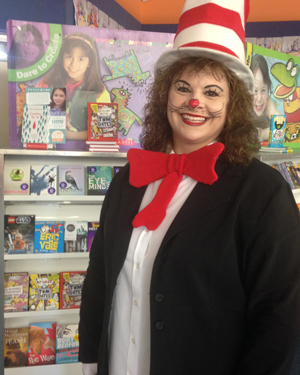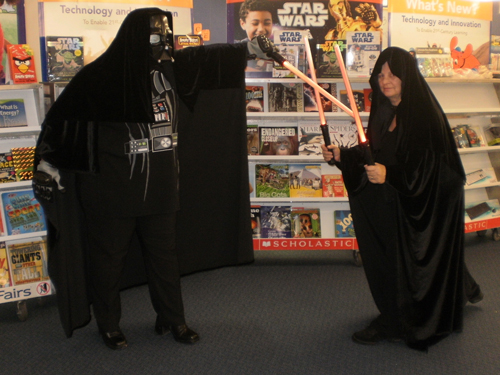Issue 93
Term 2 2015
Positive promotion of the school library
Australia’s favourite librarian (as voted in a competition run by ALIA) Jae Rolt talks passionately about the innovative ways she uses to promote the library at Cessnock West Public School and get children excited about reading.
After I was named Australia's Favourite Librarian people began asking what it is that makes me so popular with my students, families, colleagues, and community.
Whilst the ideas here work for me, they may not work for everyone. Sometimes you need to try other ways to find what works for you and your school. The key is not to give up; keep trying until your library is as good as it can be.
Communicate with students
The first step is to learn students' names. While I have 15 classes, I can name every single child in the school. I call the roll each lesson, not to check attendance, but to match names to faces.
This is part of my overall belief in making each child feel special. I was once told that there are over 7 billion people on this planet and that if a child has chosen to talk to you, you should feel special. When students come into the library during lunch, they are allowed to draw and every day I am presented with various drawings or snowflake cut outs. Every single one of them goes on display for the term. They have given me a gift to brighten my day, so I treat it as such. I make the time to chat with the children who come into the library and listen to the suggestions they make. If a child recommends a book to me and I decide to purchase it, that child is the first to borrow it as a reward for suggesting something new. Students love talking about the books they are reading. If there is a series they are excited about, I take the time to read it so I can chat with them about it.
I find that maintaining a strong Library Monitor Program is highly valuable in creating a lively library atmosphere. I choose the library monitors myself, and library monitors are held in high regard at Cessnock West Primary School; it is a badged job, like School Captain. Students often start asking what they need to do to apply for the role as early as year 2. I let these younger students help out around the library and those who maintain a strong interest usually end up as a library monitor in year 6.
I'm a big believer that rewarding students can strengthen the bond they feel for their library. For regular borrowing I give out merit awards and a little prize. I keep a list each lesson of who has borrowed. I present certificates for the best borrowing classes in each stage. I also add this information to the newsletter so parents know the best borrowing classes - there is nothing like a bit of friendly rivalry. If a class receives 20 certificates throughout the year, I award the whole class with a prize. I make sure to give out books as prizes where possible. You can use any reason to give away books.
Make sure to follow up with students on overdue books and remember that our students are just kids. Do not assume that because you've told them they will remember. I always print overdue notices on bright orange paper so they stand out in the school bag and are more likely to be seen by parents.
Communicate with parents

The Cat in the Hat
To facilitate this, I always make sure to attend the Kindergarten orientation meetings. They are a great way to meet the new families at the school and to let them know how the library runs. It also gives parents the chance to offer to help out in the library. It is important to encourage and appreciate parent helpers. I teach them what needs to be done in the library, find their strengths, and work with that. There is no use getting a parent to sort non-fiction if they hate numbers. I have set times for training that works around my RFF/admin time, however once trained, parents are allowed to come in and assist at whatever time suits them. As a school we reward parent helpers with a morning tea at the end of the year. I always make sure my parent helpers are invited and I take the time to chat with them and thank them for their contributions.
I also have a page in the school newsletter advising of upcoming events, thanking parents for returning overdue books, and acknowledging all my parent helpers. The school has a Facebook page which allows me to communicate with parents outside of school hours and provide answers quickly. I also use the Skoolbag app and make sure to keep it updated. This allows for quick and easy communication of events. It comes in especially useful for informing parents of last minute changes, cancellations, or excursion updates. This means that positive relationships are built between the school and the families of those who attend. The app also allows us to schedule alerts and any events that we post can be added to smartphone calendars with one click.
I always take book donations from parents where possible. I treat all donations in the same way I would a new book. I consider them against my collection development policy and I make a point of telling parents that I will happily accept their books. I make it clear that if I find they are not suitable for the library or I already have the book, I will donate it to a classroom or charity. Most parents are happy just to know their books have found a new home. Any books I don't keep, I treat in the same way I do a culled book - I offer them to staff, then to students for a gold coin donation, if the offer is not taken up, I donate them to a charity. I use any money raised to buy new books to add to the library collection.
To further help with community interaction, I have a regular spot on the local radio station. One day each year I visit the local station with 3 library monitors. The radio presenter interviews us for about an hour and during this time I have the opportunity to advertise our Book Fair and remind the community they don't have to be a school parent to come in to find a bargain. We had over $8500 in sales last year - pretty good for a school of 370 students.
Communicate with staff
Communication within the school is just as important. I make sure to share any information that I receive from other teacher librarians with my fellow staff members. For example, if I see great information coming through the NSWTLnet about a topic they are studying, I'll pop it in an email and send it out to the relevant stage. All it takes is a few seconds to forward an email which they can then keep or delete as they see fit. I also make sure that staff at my school can search for books they want independently. However, I make sure to be around to help them find the books so I can use my expertise to add in other resources that might be beneficial.
When time permits, I make sure to share new resources with my peers at our staff meetings. Otherwise they may not know what new books have come in and they generally don't have enough time to browse the new-book shelves each week. Showing them what is new is a great way to start getting them interested in the collection.
Survey clientele
I regularly use SWOT analysis to find out the strengths, weaknesses, opportunities, and threats according to my library users. I use this information to assist in the future planning of the library. Feedback is a gift and if you are asking for it, then you should be prepared for any answer that may come your way; don't take them personally.
I look at what suggestions have been made to enhance the library and start with the things that can be achieved quickly and easily, then move onto the more time consuming aspects. I make a list, prioritise it, and work through it. I make sure to do another survey after a year or two and see if the respondents have noticed the changes and/or can suggest anything new.
Know your collection
I strongly believe that if you are new to your library, taking the time to do the borrowing, returning, and re-shelving is the fastest way to learn. You will get to know which books are the high movers and which haven't moved. If books haven't been borrowed in a few years there has to be a reason. Are they in a spot where no one can find them? Are they irrelevant to the needs/interests of students/staff/curriculum? If they are no longer worth taking up space in the library, cull them.

Darth Vader and the Emperor
If you are having trouble deciding what to cull, a great place to start is with the books you have multiple copies of that you no longer need (for example, I had eight copies of each Harry Potter book so six of each were culled and sold).
Have fun
Last, but definitely not least, the greatest way of promoting your school library is to enjoy it, and I find that one of the best ways of doing this is by dressing up. Regardless of the reason, if there is a dress up day at school, I join in. During the week of Book Fair I dress up every single day in different costumes and I make sure I am seen by everyone on those days. I add pictures of my costumes to the school Facebook page. This gets the parents talking about the library. For me it is about getting the kids involved, getting the parents into the school, and having some fun and selling books along the way.
This article is based on a presentation given at the 2014 MANTLE conference. If you would like further information or have an idea or success story you would like to share with me, please feel free to contact me: [email protected]
Image credits
- The Cat in the Hat. Courtesy of Jae Rolt.
- Darth Vader and the Emperor. Courtesy of Jae Rolt.
